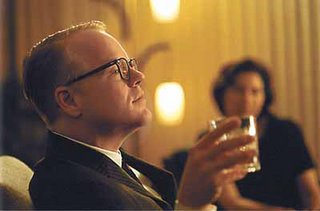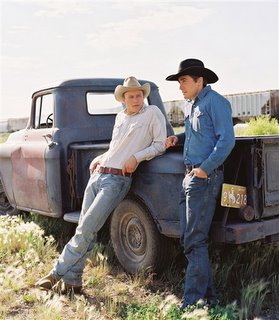CAPOTE

Official Capote Site
Drama/Biography
Starring:Philip Seymour Hoffman, Catherine Keener, Clifton Collins, Jr., Chris Cooper
Rated R (for language, violent images)
Running Time: 98 Minutes
Released:September 2, 2005




4 Out Of 5 Bites
by Glenn Johnson
Cast whatever accolades one may at the feet of Philip Seymour Hoffman's rendition of Truman Capote, but this is an undeniably accurate effort of a character reproduction of the real thing as one may see.
Hoffman captures the self-absorption of the literary star exquisitely, right down to the glibly-lisped one-liners and story-telling panache that tickles the ears of his raptured socialites who encircle his feet. With nonchalance, Capote is always looking down, perhaps faintly through his nose, at whatever is before him. But you never get the sense that- if even in his own warped way- genuine caring is beyond him. It is just that his motivation is steeped in his star-ridden aspirations and his desire for attention ever muddle the lines.
Director Bennett Miller's Capote is a reference point for narcissism's inability to separate genuine concern for more self-serving ends, highlighting the gay author's friendship with convicted murderer Perry Smith (Clifton Collins). Capote's investigation began as an effort toward a magazine article, but quickly transitioned to a book once Capote realized the dramatic wealth present in the story. Capote becomes smitten by Smith and quickly blinded by his lure toward the convict in prospects of the impending possibility that his book might never be completed as long as there are stays of execution for the prisoners. Capote had secured legal counsel for the convicts early on, partly as much to enable more intimate time with Smith as to garner material for the book. But the move compounds the greater need Capote feels to finish his work and satisfy his publisher, his adoring crowd and subsequently his desperate ego needs.
The pair form a bond that is challenged by Capote's larger-than-life agenda. Capote wants to help, but he can't define the line between callous self-regard and compassionate concern.
Journalistic endeavors and the manipulative ways it employs to get "good story" is also central here, with underhanded betrayals and glad-handing bribery as the modus operandi with which to get in. Once "in," Capote could never have fathomed the exacting toll it would take on not only his professional life, but his personal life as well. It is this knowledge of the denouement of Capote's life in actuality that marks the film with vigor.
In 1959, Capote comes across the news of a Kansas family gunned down and subsequently contacts the editor of the New Yorker with the idea of a magazine article that quickly turns to a book proposal. Capote swooshes into the tiny place with his requisite fanfare and the hope that his work would detail how this small community was dealing with the news. He just begins to befriend a Kansas Bureau of Investigation agent (Chris Cooper) for some insider information when the two murderers are apprehended out west.
After their conviction, Capote entrenches himself in the story behind the story- mainly of the murderer Smith- because he sees so much of himself in him. One wonders if the pity Capote feels for Smith is only a newly discovered vehicle to access his own lost sadness for himself. He says of Smith and himself: "It's as if Perry and I grew up in the same house. And one day he went out the back door and I went out the front."
He tells his friend and research assistant, Harper Lee (Catherine Keener), that he might have a nervous breakdown if their appeal for a stay of execution is granted. The film depicts in the grayest of fashion the line between what is true compassion and self-absorbency, because for Capote, you get the feeling he may not even be able to delineate that himself. After the execution, Capote tearfully pines that he couldn't have done anything to save them. To which, Lee responds tellingly: "Maybe not, Truman. But the truth is, you didn't want to."
The six years of life that passes in the effort to finish the project would ultimately see the publishing of Lee's novel To Kill a Mockingbird and craft a movie in the meantime. The era would begin to spell out a spirlling downward of Capote, who did manage to finish In Cold Blood, a new genre that would change the face of modern literature to come. Unfortunately, heavy drinking and the ensuing emotional disintegration from the experience arguably quickened his demise. As a snapshot study of the some of the contributing factors to that, Capote has every leg to stand on and should not be missed, if not for Hoffman's performance alone.





